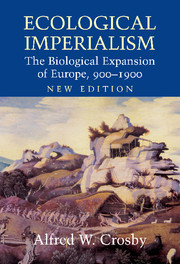Book contents
- Frontmatter
- Dedication
- Introduction
- Contents
- List of illustrations
- Preface to the new edition
- Acknowledgements
- 1 Prologue
- 2 Pangaea revisited, the Neolithic reconsidered
- 3 The Norse and the Crusaders
- 4 The Fortunate Isles
- 5 Winds
- 6 Within reach, beyond grasp
- 7 Weeds
- 8 Animals
- 9 Ills
- 10 New Zealand
- 11 Explanations
- 12 Conclusion
- Appendix: What was the “smallpox” in New South Wales in 1789?
- Notes
- Index
9 - Ills
Published online by Cambridge University Press: 05 August 2013
- Frontmatter
- Dedication
- Introduction
- Contents
- List of illustrations
- Preface to the new edition
- Acknowledgements
- 1 Prologue
- 2 Pangaea revisited, the Neolithic reconsidered
- 3 The Norse and the Crusaders
- 4 The Fortunate Isles
- 5 Winds
- 6 Within reach, beyond grasp
- 7 Weeds
- 8 Animals
- 9 Ills
- 10 New Zealand
- 11 Explanations
- 12 Conclusion
- Appendix: What was the “smallpox” in New South Wales in 1789?
- Notes
- Index
Summary
The colony of a civilized nation which takes possession, either of waste country, or of one so thinly inhabited, that the natives easily give place to the new settlers, advances more rapidly to wealth and greatness than any other human society.
—Adam Smith, An Inquiry into the Nature and Causes of the Wealth of Nations (1776)Old world germs were entities having size, weight, and mass, just like Sweet Betsy, her Ike, and their animals; germs required transportation across the oceans, which the marinheiros unintentionally supplied. Once ashore and lodged in the bodies of new victims in new lands, their rate of reproduction (as often as every twenty minutes) enabled them to outperform all larger immigrants in rapidity of increase and speed of geographical expansion. Pathogens are among the “weediest” of organisms. We must examine the colonial histories of Old World pathogens, because their success provides the most spectacular example of the power of the biogeographical realities that underlay the success of European imperialists overseas. It was their germs, not these imperialists themselves, for all their brutality and callousness, that were chiefly responsible for sweeping aside the indigenes and opening the Neo-Europes to demographic takeover.
- Type
- Chapter
- Information
- Ecological ImperialismThe Biological Expansion of Europe, 900–1900, pp. 195 - 216Publisher: Cambridge University PressPrint publication year: 2004



